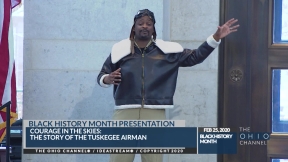

Archive
Broadcast
About



A SERVICE OF OHIO'S PUBLIC BROADCASTING STATIONS
A SERVICE OF OHIO'S PUBLIC BROADCASTING STATIONS
Program Directory

Live performance by "We've Known Rivers", Anthony Gibbs.
African Americans have served in every major military conflict in which the United States has fought. For many years, the American military--like the country at large--was segregated. Still, black men and women served their country valiantly. Among the most well-known groups of African American service members were the Tuskegee Airmen, the first group of black pilots to serve in the United States military. These members of the United States Army Air Forces served with distinction during World War II. They received numerous combat awards, including 150 Distinguished Flying Crosses, 14 Bronze Stars and three Presidential Unit Citations.
In total, nearly 16,000 people served with the Tuskegee Airmen as air traffic controllers, bombardiers, flight instructors, mechanics, navigators, pilots and technicians. Some came from Ohio, representing 20 counties throughout the state. And, after World War II ended, Tuskegee Airmen throughout the country came to central Ohio.
In March 1946, Tuskegee Airmen began to arrive at Lockbourne Army Airfield (known today as Rickenbacker Air National Guard Base) outside of Columbus. Unlike at other bases where they were stationed, black service members worked without the immediate supervision of whites at Lockbourne. Colonel Benjamin O. Davis, Jr., commanded the Franklin County base, becoming the first black officer to command an Army Air Force base in the continental United States. The independence African Americans enjoyed at Lockbourne led Charles Dryden, a former Tuskegee Airman, to say, "Everywhere on the base there was evidence of striving for perfection. [Lockbourne was] 'our' base, run, from top to bottom and all in between, by 'us.'" In fact, by 1948, 75 percent of all black officers in the Air Force were stationed at Lockbourne (by then, it was renamed Lockbourne Air Force Base).
That same year, President Harry S. Truman issued Executive Order 9981, which desegregated America's armed forces. Though considered a critical piece of the civil rights movement, it proved bittersweet for some. For example, Lewis Lynch, a Tuskegee Airman from Columbus who served at Lockbourne, said, "When they integrated the Air Force, I found that we had to prove all over again that we could fly¿The 332nd [Fighter Group, a unit stationed at Lockbourne] itself was the best-kept secret in the Air Force." One year after President Truman ordered the military to desegregate, the 332nd Fighter Group was deactivated at Lockbourne, marking the end of the Tuskegee Airmen.
We've Known Rivers is a group of dynamic storytellers that commemorate the African American experience in American history through engaging first-person presentations.
African Americans have served in every major military conflict in which the United States has fought. For many years, the American military--like the country at large--was segregated. Still, black men and women served their country valiantly. Among the most well-known groups of African American service members were the Tuskegee Airmen, the first group of black pilots to serve in the United States military. These members of the United States Army Air Forces served with distinction during World War II. They received numerous combat awards, including 150 Distinguished Flying Crosses, 14 Bronze Stars and three Presidential Unit Citations.
In total, nearly 16,000 people served with the Tuskegee Airmen as air traffic controllers, bombardiers, flight instructors, mechanics, navigators, pilots and technicians. Some came from Ohio, representing 20 counties throughout the state. And, after World War II ended, Tuskegee Airmen throughout the country came to central Ohio.
In March 1946, Tuskegee Airmen began to arrive at Lockbourne Army Airfield (known today as Rickenbacker Air National Guard Base) outside of Columbus. Unlike at other bases where they were stationed, black service members worked without the immediate supervision of whites at Lockbourne. Colonel Benjamin O. Davis, Jr., commanded the Franklin County base, becoming the first black officer to command an Army Air Force base in the continental United States. The independence African Americans enjoyed at Lockbourne led Charles Dryden, a former Tuskegee Airman, to say, "Everywhere on the base there was evidence of striving for perfection. [Lockbourne was] 'our' base, run, from top to bottom and all in between, by 'us.'" In fact, by 1948, 75 percent of all black officers in the Air Force were stationed at Lockbourne (by then, it was renamed Lockbourne Air Force Base).
That same year, President Harry S. Truman issued Executive Order 9981, which desegregated America's armed forces. Though considered a critical piece of the civil rights movement, it proved bittersweet for some. For example, Lewis Lynch, a Tuskegee Airman from Columbus who served at Lockbourne, said, "When they integrated the Air Force, I found that we had to prove all over again that we could fly¿The 332nd [Fighter Group, a unit stationed at Lockbourne] itself was the best-kept secret in the Air Force." One year after President Truman ordered the military to desegregate, the 332nd Fighter Group was deactivated at Lockbourne, marking the end of the Tuskegee Airmen.
We've Known Rivers is a group of dynamic storytellers that commemorate the African American experience in American history through engaging first-person presentations.
February 25, 2020


